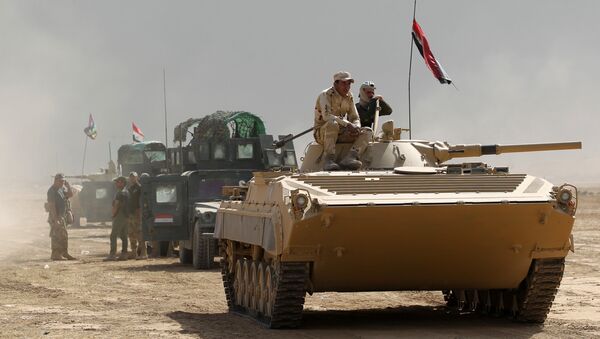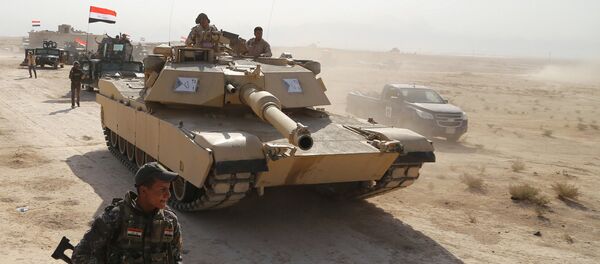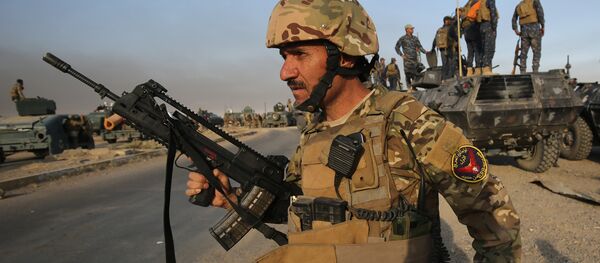On Monday, the battle for the Daesh-held city of Mosul, Iraq officially began. Announcing the start of the operation on Iraqi television late Sunday, Iraqi Prime Minister Haidar al-Abadi confidently noted that "the victory bell has rung, and the heroic operation to liberate Mosul has begun."
Iraqi security forces and militia, Kurdish Peshmerga, US, and Turkish forces are all expected to take part in the operation in one form or another, but only the Iraqis are expected to enter Mosul proper. Over 80,000 troops are participating in the operation, against anywhere between 4,000 and 10,000 Daesh fighters and their allies, including Sufist Naqshbandi Army insurgents.
Discussing the broader significance of the military operation in an article for Expert magazine, Gevorg Mirzayan, associate professor of political science at Russia's Financial University, explained that whatever happens next, even a speedy victory in Mosul will be a pyric one for Washington, unless the US fundamentally changes its foreign policy thinking.
"This time, however, a speedy victory looks unlikely. Daesh is acquainted with the experience of 2003 (its fighters were factually taught by the officers of the former Iraqi army), and has taken the necessary preventative measures. Thus, the terrorists publicly executed those who planned to negotiate with the Americans to surrender the city, and announced that they would fight to the bitter end. That means that the operation could drag on for months."
"Obviously, it will include cutting the city off from all utilities, pressing militants out from suburbs and surrounding villages, and the mandatory bombing by US aviation."
It's quite curious, according to Mirzayan, to observe the difference in tone in the Western media's discussion of the Mosul operation, compared to the one in Aleppo. "This morning, I appeared on the BBC. Prior my segment, the anchor enthusiastically talked about preparations for 'the important and necessary operation to liberate Mosul', before switching in mid-sentence to talking about 'suffering of the civilian population in Aleppo.' When I asked what they will say days from now, when Mosul's civilians start dying under coalition bombs, I received no answer; they probably had nothing to say."
In any case, the analyst noted, since the US will be unlikely to sanction themselves over their own military campaign, "Washington can carry out the operation over a long time, and without much media pressure."
"Mosul has to be taken by Obama, if not before the elections (which is unlikely), then at least before the end of his presidency. Mosul's liberation could help to at least neutralize the mistake his Republican opponents say he made in Iraq. The terrorists were able to capture the city and much of the country largely because Obama 'pulled the troops out too early' – that is, proved unable to come to agree with the Iraqi government on the terms of a future US military presence on Iraqi territory."
At the same time, it's crucial for the US and its allies to be the ones to liberate the city, not the Iranians. "That is why, apparently, neither the Iranian Revolutionary Guard, nor Shia militias, are participating in the operation. The reasons seem purely political. Washington wants to make sure that the victory is attributed to Washington-allied forces, and not 'privatized' by the Iranians."
"The second time pressure is Raqqah," Mirzayan noted. "The US must take Daesh's capital in Iraq before Syrian and Russian forces take the Daesh capital in Syria. The 'race for the capitals' is quite easy to explain; the US wants to pull the cloak of 'real fighters against international terrorism' over themselves; to do so, they need a clear and unconditional symbol of their military victories against Daesh."
"Apparently, the modern version of the 'Race for Berlin' is of benefit Washington. Even if the operation to take Mosul drags on for months, the city is likely still be liberated earlier than Raqqah. After all, after the liberation of Aleppo, Damascus, Moscow and Tehran will first have to engage in Idlib and northwest Syria, and come to an agreement with the 'moderate opposition'. Only after that will they be able to afford deploying forces in the east to liberate Raqqah."
However, Mirzayan suggested that "the image of a victory (however hyped) will not be able to solve the US's main problem in the Middle East. This problem is not Daesh…[but] the complete loss of the US's sense of national interest in the region. Crudely speaking, it's not about Iran taking over the region, or Russia's entry into it, nor the Turks playing the Kurdish card; it is about the US, by their own tactical myopia, allowing their geopolitical rivals to carry out these operations."
Ultimately, the analyst noted that "the next administration will benefit not by reveling in the liberation of Mosul (as Obama once reveled in killing bin Laden) but by revising their strategy in the Middle East – or more precisely, creating one in the first place."







